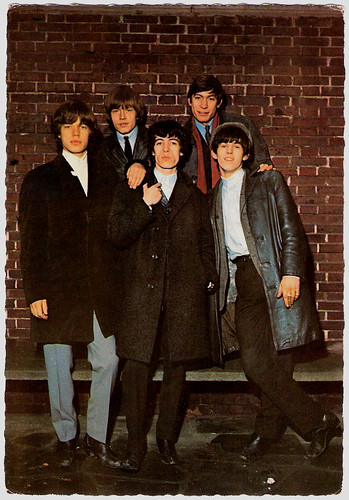
French postcard by PSG / Korès, no. 445. The Rolling Stones, with Charlie Watts right above.
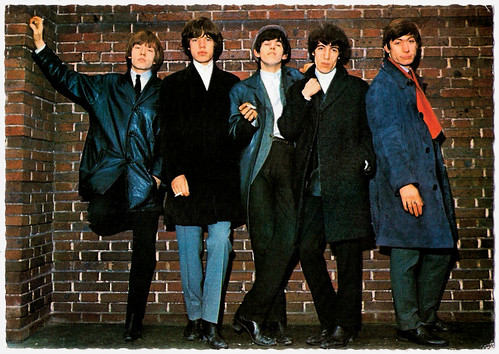
French postcard by PSG, no. 446. The Rolling Stones. Charlie Watts is on the far right.

West-German postcard by Krüger, no. 902/315. Photo: Michael Lyons. The Rolling Stones with Charlie Watts in the middle.

West-German postcard by Krüger, no. 902/316. Photo: Michael Lyons. The Rolling Stones. Charlie Watts is in the middle.
The British invasion
The Rolling Stones was formed in 1962 in London when original leader Brian Jones and pianist Ian Stewart were joined by singer Mick Jagger and guitarist Keith Richards, whose songwriting partnership later contributed to their taking the leadership role in the group.
Bassist Bill Wyman and drummer Charlie Watts completed the early line-up. Ian Stewart was removed from the official line-up in 1963 but continued to work with the band as road manager and keyboardist until his death in 1985.
The band's early recordings were mainly covers of American blues and R&B songs. After first achieving success in the UK, they became popular in the US during the ‘British Invasion’ of the early 1960s.
Their 1965 single '(I Can't Get No) Satisfaction' established The Rolling Stones as a premier rock and roll act. It was composed by Keith Richards in his sleep, and with the addition of provocative lyrics by Mick Jagger, it became their greatest hit.
During 1966-1969 they toured the world and constantly updated their song-list with great hits like 'Let's Spend the night together' (1967), 'Sympathy for the Devil' (1968), and 'Honky Tonk Woman' (1969).
The rehearsal and recording of 'Sympathy for the Devil' were filmed by Jean Luc Godard, who used it in his satirical collage of rock documentary and political commentary, One Plus One/Sympathy for the Devil (Jean-Luc Godard, 1968).
The following year the first concert film of the Stones was released: The Stones in the Park (Leslie Woodhead, 1969).
It was followed by the harrowing documentary Gimme Shelter (Albert & David Maysles, 1970). In December of 1969, four months after Woodstock, the Rolling Stones, and Jefferson Airplane gave a free concert in Northern California, east of Oakland at Altamont Speedway. About 300,000 people came, and the organizers put Hell's Angels in charge of security around the stage. Armed with pool cues and knives, Angels spent the concert beating up spectators, killing at least one.
Cocksucker Blues (1972) was a film by photographer Robert Frank on the 1972 American tour. The film was not released by the Stones reportedly because it contained scenes of drug use and groupie orgies.

Dutch postcard by 't Sticht, Utrecht, no. AX 6302.
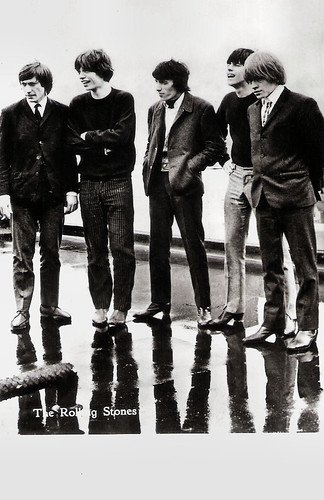
Dutch postcard.

Dutch postcard by 't Sticht, Utrecht, no. AX 1187.

Dutch postcard, no. 6223.
It's only rock and roll
In 1969, Brian Jones died shortly after being fired from the band. He was replaced by Mick Taylor.
At the end of the 1960s, the creativity of The Rolling Stones reached new highs. Their albums 'Beggars Banquet' (1968) and 'Sticky Fingers' (1971) were among the most popular albums they ever made. They had hits as 'Wild Horses' and 'Brown Sugar'.
During the 1970s, the Rolling Stones remained the biggest band in the world. In 1974 former Faces guitarist Ronnie Wood replaced Mick Taylor. Wood has been with the band ever since.
The Stones made thousands of live performances and multi-million record sales with hits like 'Angie' (1973), 'It's Only Rock and Roll' (1974), 'Hot Stuff' (1976), and 'Respectable' (1978).
At that time both Keith Richards and Mick Jagger had individual ambitions and applied their untamed creativity in various projects outside the Stones.
Wyman left the Rolling Stones in 1993. Bassist Darryl Jones, who is not an official band member, has worked with the group since 1994. The Rolling Stones have sold more than 200 million albums worldwide.
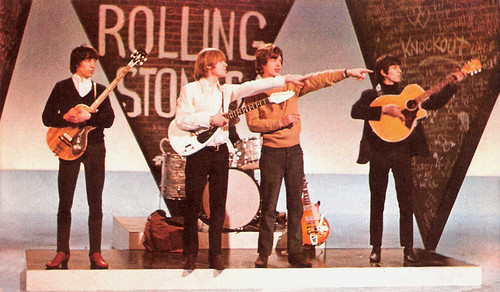
French postcard by PSG, no. 1189, offered by Corvisart, Epinal. Photo: Decca.

West-German Kolibri postcard by Friedrich-W. Sander-Verlag, Minden/Westf, no. 2474. Photo: Teldec / Decca London. The Rolling Stones, with Charlie Watts on the far right.

Italian postcard by Silvercart, Milano, no. 516/7.
A challenge to respectable standards
Mick Jagger (1943) has been called "the heart of The Stones" and Keith Richards (1943) "the soul".
Jagger dropped out of college and never received a formal musical education, and even could not read music. Every move of Jagger on-stage and off-stage seemed to signal a challenge to respectable standards. The public loved it.
Jagger worked hard and emerged as the lead singer and songwriter in partnership with Richards, following the example of John Lennon and Paul McCartney's songwriting for The Beatles.
Mick Jagger also starred in several films, such as Performance (Nicolas Roeg, Donald Cammell, 1970), Ned Kelly (Tony Richardson, 1970), Running Out of Luck (Julien Temple, 1987), Freejack (Geoff Murphy, 1992), Bent (Sean Mathias, 1997), and The Man from Elysian Fields (George Hickenlooper, 2001).
Keith Richards was a schoolmate of Jagger since primary school. In 1960 they contemplated starting up a band together. Since the formation of the Rolling Stones in 1962, Richards has been the principal songwriting partner with Jagger, and most of the songs on all Rolling Stones albums are credited to Jagger/Richards.
Besides his music career, Richards made a cameo appearance as Captain Teague, the father of Jack Sparrow (Johnny Depp) in Pirates of the Caribbean: At World's End (Gore Verbinski, 2007).

Dutch postcard.
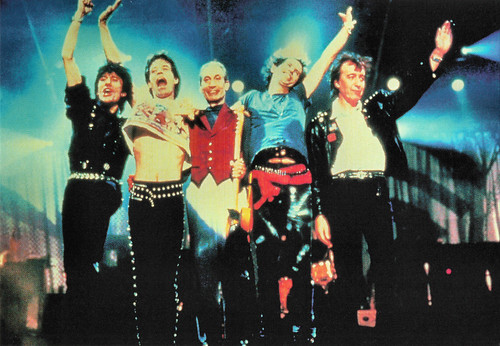
British postcard by Go Card. Photo: Rolling Stones at the Max. Caption: A 90-minute IMAX concert experience! Charlie Watts is in the middle.
50 & Counting
In 2008 the Rolling Stones united with legendary director Martin Scorsese for Shine A Light (2008). For this career-spanning documentary, Scorsese used concert footage from their A Bigger Bang tour and he filmed the Stones over a two-day period at the intimate Beacon Theatre in New York City in the fall of 2006. In between, there are some short clips of old Stones interviews and some Behind-the-Scenes-Footage.
It was followed by The Stones in Exile (Stephen Kijak, 2010). This documentary gives a look at the creation and impact of the 1972 Rolling Stones album Exile on Main St.
The Rolling Stones celebrated their 50th anniversary in the summer of 2012 by releasing a large hardback book titled '50'. It was followed by a documentary titled Crossfire Hurricane (Brett Morgen, 2012). Approximately fifty hours of interviews were conducted by Morgen for use for the documentary, including interviews with Bill Wyman and Mick Taylor.
In November 2012, the Stones started their 50 & Counting tour, which kept them busy throughout 2013. It was followed by a live DVD, Sweet Summer Sun: Live in Hyde Park (2013). In 2027 followed the No Filter Tour. From Wyman's departure in 1993 to Watts' death in 2021, the band continued as a four-piece core, with Darryl Jones playing bass on tour and on most studio recordings.
Trailer for Sympathy For The Devil (1968). Source: ABKCO Records & Films (YouTube).
Trailer for Gimme Shelter (1970). Source: HD Retro Trailers (YouTube).
Trailer for Performance (1970). Source: Warner Bros. (YouTube).
Trailer for Bent (1997). Source: LGBT MONEY (YouTube).
Trailer for the documentary Shine A Light (2008), directed by Martin Scorsese. Source: VidereTrailer (YouTube).
Trailer for The Stones in Exile (2010). Source: Mercury Studios (YouTube).
Sources: Steve Shelokhonov (IMDb), Wikipedia, and IMDb.
This is a post I didn't expect! Fantastic, and great to see all the movie trailers in one place. I have seen The Rolling Stones 5 times (1972 - Stevie Wonder was opening act, 1982 - Prince and George Thoroughgood and the Destroyers were opening act, and three times in the 90s - can't remember the opening acts), and each was fantastic in its own way. My son asked me the other day what was my favorite Rolling Stones song - I couldn't pick one. However, Sympathy for the Devil, Goodbye Ruby Tuesday, and Shattered come to mind, pretty quickly. However, if I were at a dinner party and songs were being shouted out as favorites, I am sure I would be fickle, very quickly.
ReplyDelete